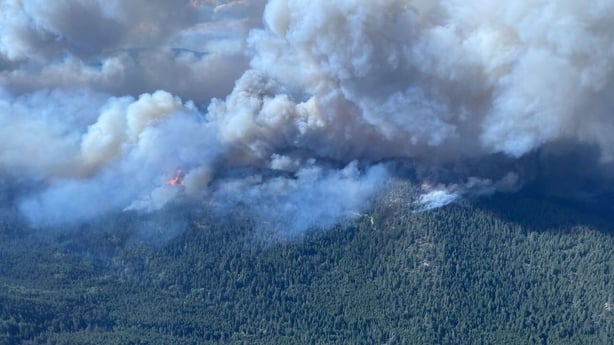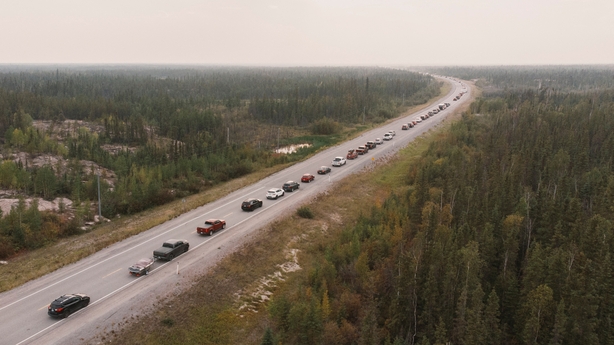The remaining residents of Yellowknife sought to leave the remote northern Canadian city before flames blocked their exit, while another wildfire in the western province of British Columbia prompted new evacuation orders.
A state of emergency was declared early today in Kelowna, a city some 300km east of Vancouver with a population of about 150,000.
The Pacific province said the next 24 to 48 hours could be the most difficult.
Some of the hills around the city blazed in the predawn light after wildfires that had been burning since Tuesday crossed Lake Okanagan and spread into parts of Kelowna.
"We fought hard last night to protect our community," Jason Brolund, West Kelowna fire chief, told reporters.
"Night turned to day because of the orange glow of the clouds and the fire."
More than 2,400 properties were evacuated, officials said, and thousands more are on alert to leave with little notice if necessary.
Several structures were destroyed in West Kelowna during the night, he said.
"Today is going to be a challenging day again. The winds are stronger than they were yesterday," Mr Brolund added.
"People are going to see that glow again" tonight, "and it's going to look worse than you ever expected".
The expanse of fires and disruption to life and land underscore the severity of this year's worst-on-record Canadian wildfire season, with more than 1,000 active fires burning across the country.
Some 1,425km to the northeast, the massive blaze threatening Yellowknife, the Northwest Territories' capital city, made little progress yesterday, but changing winds meant it could reach the outskirts by the weekend, the territorial fire service said, because of successful firefighting.
However, strong winds forecast for today and tomorrow are still blowing the blaze toward the city, and it could reach the outskirts by the weekend.
"Critical, challenging days" lie ahead, the fire service said.
The fire is about 15km northwest of the city, but changing winds are expected to drive it closer.
Blazes have been burning on either side of the only highway out of town, but it remained open.
"Leaving Yellowknife, you're driving into the smoke," said Brent Saulnier, who had been visiting the city from neighbouring Alberta. "It is on fire on both sides of the road ... It's a very surreal experience."
The deadline to leave the city of around 20,000 was set at 12pm local time today (7pm Irish time).
"The noon deadline doesn't mean that the highway closes at noon," Yellowknife Mayor Rebecca Alty said in an interview with CBC.
"We're just really encouraging folks to go as soon as possible. The highway will continue to be open as long as it's safe."
Flights will also continue after the deadline, Ms Alty added.

Calgary, Alberta, received 15 evacuee flights from the Northwest Territories yesterday and is expecting an additional 26 flights today carrying approximately 2,300 people, the city said.
The Canadian military flew out 79 people yesterday and scheduled more flights today.
Around 65% of the 46,000 total population of Northwest Territories looked set to be evacuated.
Firefighting teams were cutting down vegetation to create fire breaks, deploying sprinkler systems and setting deliberate fires to eliminate fuel before the bigger blaze approaches, the fire service said.

Experts say that climate change has exacerbated the wildfire problem.
Drought and high temperatures have been a contributing factor to the number and intensity of this year's fires, officials say. Much of Canada has seen abnormally dry conditions.
As the number of evacuees in Grande Prairie and St. Albert, on the northern outskirts of Edmonton, increased, both cities announced their centers reached their full capacities and redirected all arriving evacuees to a new center in Leduc south of the provincial capital of Edmonton.
Among them was the Gour family from the town of Hay River.
When they received an alert on their phones while camping out, the family was left uncertain about where their son, Liam, 13, was going to land as he was returning from a cadet trip in the neighbouring territory of Yukon.
As the family made their way toward Alberta, what mattered most to Paula Gour was her family.
"The only thing that I had in mind was that I had the kids, the dogs, and we had each other and just to get out of there. That's all you can really think about at that time," she said.


